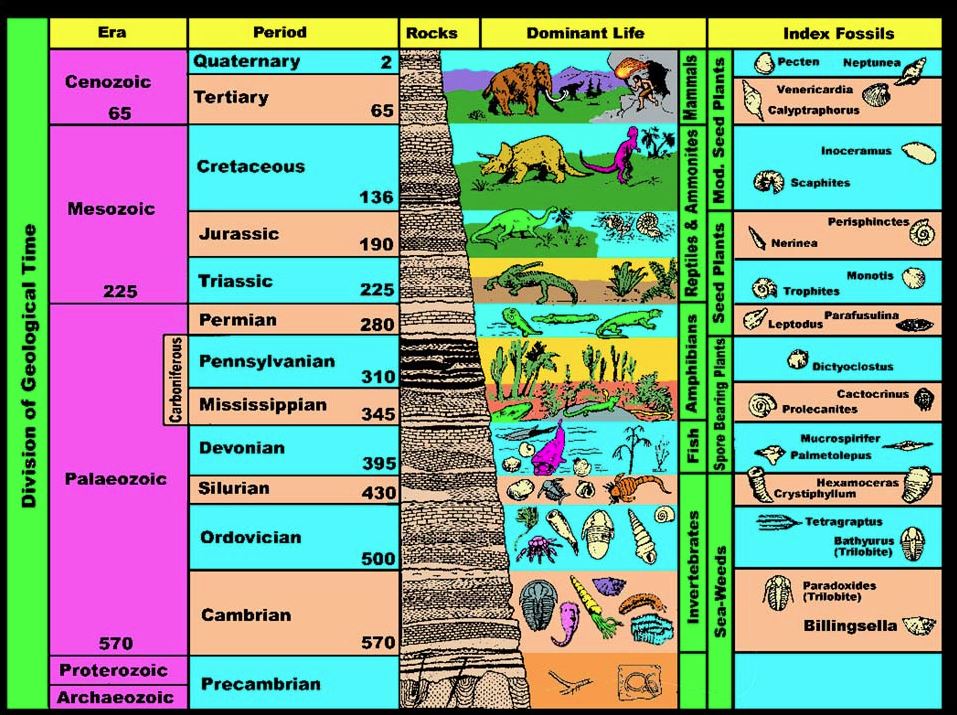Saturday, 21 October 2017
Thursday, 19 October 2017
Geologic Time Periods. what happened in each period
precambrian earliest :
1st organisms. single celled oxygen present later multicelled orgasms
540 mya:
lots of different types of orgasms
earliest animals with backbone
lots of carbon dioxide
490 mya:
lots of animals without skeleton
early shellfish, trilobites
nautilus, starfish, fish.
1st green plants of fungi
end of ice age
443 mya:
1st advanced plants
jawed fish with armour
more sellfish
Devonion:
1st ferns
354 mya:
1st fir trees with seeds
1st wingless insects
1st amphibians
some animals from earlier periods die out
early sharks
early reptiles
early trees
vertebrates
trilobites disappearing
glaciers form
winged insects
permian 290:
land masses have formed 1 continent pangaea
glaciers disappear warming up
lots of reptiles
1st cone bearing trees
beetles and flies appear
lots of lives in the ocean
251 mya - 95% life>extinct
26/10/2017
248 mya:
dinosaurs appear
first mammals and crocodiles appear
modern corals and fish
206 mya:
lots of different dinosaurs
ferns and cone bearing plants
mammals common but small
first bird and lizards
land mass pangaea breaks up into gondwanaland and laurasia
high carbon dioxide levels
144 mya:
lots of dinosaurs including tyranasaurs
new types of insects
flowering plants appear and became plentiful
modern crocodiles and sharks
early birds appear
gondwanaland breaks up
rocky mountains appear carbon dioxide similar to today
PALEOGENE:
modern plants
lots of different mammals
dinosaurs extinct
primitive whales
first grasses
rapid changes in mammals
climate cools
ice age begins and ends during this period
NEOGENE:
modern climate
modern mammals and birds
horses evolve from dog like animal
lots of grasses
first apes
southern alps of nz appear
QUATERNARY 1.8 mya present
anatomically
1. Why does NZ not have any crocodiles. 2. Why is NZ's only mammal a bat? long tailed bat 3. No Evidence of wooly mammoths in NZ. Explain why. 4. Wetas and Tuataras are living fossils. What does this mean? Suggest why we have those creatures but Australia does not.
1st organisms. single celled oxygen present later multicelled orgasms
540 mya:
lots of different types of orgasms
earliest animals with backbone
lots of carbon dioxide
490 mya:
lots of animals without skeleton
early shellfish, trilobites
nautilus, starfish, fish.
1st green plants of fungi
end of ice age
443 mya:
1st advanced plants
jawed fish with armour
more sellfish
Devonion:
1st ferns
354 mya:
1st fir trees with seeds
1st wingless insects
1st amphibians
some animals from earlier periods die out
early sharks
early reptiles
early trees
vertebrates
trilobites disappearing
glaciers form
winged insects
permian 290:
land masses have formed 1 continent pangaea
glaciers disappear warming up
lots of reptiles
1st cone bearing trees
beetles and flies appear
lots of lives in the ocean
251 mya - 95% life>extinct
26/10/2017
248 mya:
dinosaurs appear
first mammals and crocodiles appear
modern corals and fish
206 mya:
lots of different dinosaurs
ferns and cone bearing plants
mammals common but small
first bird and lizards
land mass pangaea breaks up into gondwanaland and laurasia
high carbon dioxide levels
144 mya:
lots of dinosaurs including tyranasaurs
new types of insects
flowering plants appear and became plentiful
modern crocodiles and sharks
early birds appear
gondwanaland breaks up
rocky mountains appear carbon dioxide similar to today
PALEOGENE:
modern plants
lots of different mammals
dinosaurs extinct
primitive whales
first grasses
rapid changes in mammals
climate cools
ice age begins and ends during this period
NEOGENE:
modern climate
modern mammals and birds
horses evolve from dog like animal
lots of grasses
first apes
southern alps of nz appear
QUATERNARY 1.8 mya present
anatomically
1. Why does NZ not have any crocodiles. 2. Why is NZ's only mammal a bat? long tailed bat 3. No Evidence of wooly mammoths in NZ. Explain why. 4. Wetas and Tuataras are living fossils. What does this mean? Suggest why we have those creatures but Australia does not.
Wednesday, 18 October 2017
Subscribe to:
Posts (Atom)

